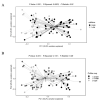The Association between Caffeine Intake and the Colonic Mucosa-Associated Gut Microbiota in Humans-A Preliminary Investigation
- PMID: 37049587
- PMCID: PMC10096519
- DOI: 10.3390/nu15071747
The Association between Caffeine Intake and the Colonic Mucosa-Associated Gut Microbiota in Humans-A Preliminary Investigation
Abstract
We examined the association between caffeine and coffee intake and the community composition and structure of colonic microbiota. A total of 34 polyp-free adults donated 97 colonic biopsies. Microbial DNA was sequenced for the 16S rRNA gene V4 region. The amplicon sequence variant was assigned using DADA2 and SILVA. Food consumption was ascertained using a food frequency questionnaire. We compared the relative abundance of taxonomies by low (<82.9 mg) vs. high (≥82.9 mg) caffeine intake and by never or <2 cups vs. 2 cups vs. ≥3 cups coffee intake. False discovery rate-adjusted p values (q values) <0.05 indicated statistical significance. Multivariable negative binomial regression models were used to estimate the incidence rate ratio and its 95% confidence interval of having a non-zero count of certain bacteria by intake level. Higher caffeine and coffee intake was related to higher alpha diversity (Shannon index p < 0.001), higher relative abundance of Faecalibacterium and Alistipes, and lower relative abundance of Erysipelatoclostridium (q values < 0.05). After adjustment of vitamin B2 in multivariate analysis, the significant inverse association between Erysipelatoclostridium count and caffeine intake remained statistically significant. Our preliminary study could not evaluate other prebiotics in coffee.
Keywords: Erysipelatoclostridium; coffee; diet; microbiome; phytochemical; riboflavin.
Conflict of interest statement
The authors declare no conflict of interest.
Figures
Similar articles
-
Effects of Coffee on Gut Microbiota and Bowel Functions in Health and Diseases: A Literature Review.Nutrients. 2024 Sep 18;16(18):3155. doi: 10.3390/nu16183155. Nutrients. 2024. PMID: 39339755 Free PMC article. Review.
-
Dairy Consumption and the Colonic Mucosa-Associated Gut Microbiota in Humans-A Preliminary Investigation.Nutrients. 2025 Feb 2;17(3):567. doi: 10.3390/nu17030567. Nutrients. 2025. PMID: 39940425 Free PMC article.
-
Dietary Fatty Acid Intake and the Colonic Gut Microbiota in Humans.Nutrients. 2022 Jun 29;14(13):2722. doi: 10.3390/nu14132722. Nutrients. 2022. PMID: 35807903 Free PMC article.
-
Dietary quality and the colonic mucosa-associated gut microbiome in humans.Am J Clin Nutr. 2019 Sep 1;110(3):701-712. doi: 10.1093/ajcn/nqz139. Am J Clin Nutr. 2019. PMID: 31291462 Free PMC article.
-
Coffee and caffeine intake and incidence of type 2 diabetes mellitus: a meta-analysis of prospective studies.Eur J Nutr. 2014 Feb;53(1):25-38. doi: 10.1007/s00394-013-0603-x. Epub 2013 Oct 23. Eur J Nutr. 2014. PMID: 24150256 Review.
Cited by
-
Sex Related Differences in the Complex Relationship between Coffee, Caffeine and Atrial Fibrillation.Nutrients. 2023 Jul 25;15(15):3299. doi: 10.3390/nu15153299. Nutrients. 2023. PMID: 37571236 Free PMC article. Review.
-
Stress and depression-associated shifts in gut microbiota: A pilot study of human pregnancy.Brain Behav Immun Health. 2024 Jan 26;36:100730. doi: 10.1016/j.bbih.2024.100730. eCollection 2024 Mar. Brain Behav Immun Health. 2024. PMID: 38323225 Free PMC article.
-
Effects of Coffee on Gut Microbiota and Bowel Functions in Health and Diseases: A Literature Review.Nutrients. 2024 Sep 18;16(18):3155. doi: 10.3390/nu16183155. Nutrients. 2024. PMID: 39339755 Free PMC article. Review.
-
Coffee consumption is associated with intestinal Lawsonibacter asaccharolyticus abundance and prevalence across multiple cohorts.Nat Microbiol. 2024 Dec;9(12):3120-3134. doi: 10.1038/s41564-024-01858-9. Epub 2024 Nov 18. Nat Microbiol. 2024. PMID: 39558133 Free PMC article.
-
Investigating Plasma Metabolomics and Gut Microbiota Changes Associated With Parkinson Disease: A Focus on Caffeine Metabolism.Neurology. 2025 May 27;104(10):e213592. doi: 10.1212/WNL.0000000000213592. Epub 2025 Apr 24. Neurology. 2025. PMID: 40273394 Free PMC article.
References
-
- Barre T., Fontaine H., Ramier C., Di Beo V., Pol S., Carrieri P., Marcellin F., Cagnot C., Dorival C., Zucman-Rossi J., et al. Elevated coffee consumption is associated with a lower risk of elevated liver fibrosis biomarkers in patients treated for chronic hepatitis B (ANRS CO22 Hepather cohort) Clin. Nutr. 2022;41:610–619. doi: 10.1016/j.clnu.2022.01.016. - DOI - PubMed
MeSH terms
Substances
Grants and funding
LinkOut - more resources
Full Text Sources
Medical




